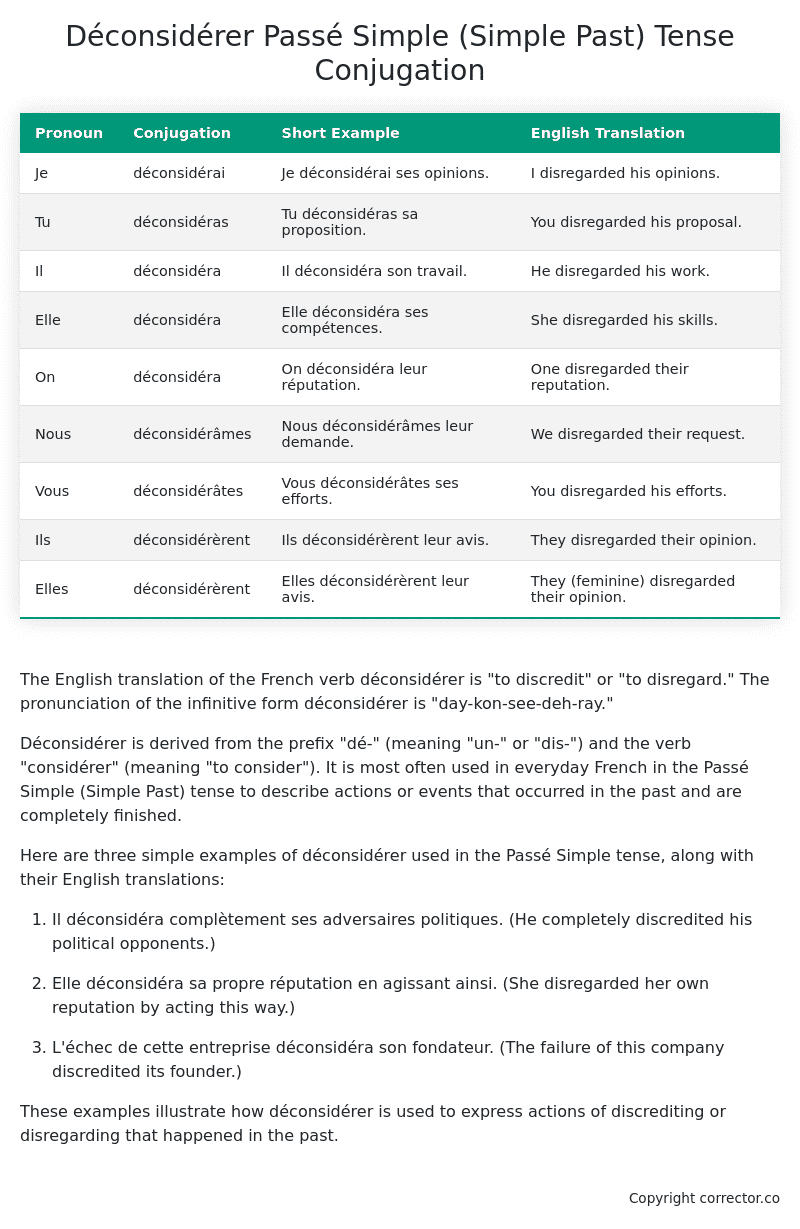Passé Simple (Simple Past) Tense Conjugation of the French Verb déconsidérer
Introduction to the verb déconsidérer
The English translation of the French verb déconsidérer is “to discredit” or “to disregard.” The pronunciation of the infinitive form déconsidérer is “day-kon-see-deh-ray.”
Déconsidérer is derived from the prefix “dé-” (meaning “un-” or “dis-“) and the verb “considérer” (meaning “to consider”). It is most often used in everyday French in the Passé Simple (Simple Past) tense to describe actions or events that occurred in the past and are completely finished.
Here are three simple examples of déconsidérer used in the Passé Simple tense, along with their English translations:
-
Il déconsidéra complètement ses adversaires politiques.
(He completely discredited his political opponents.) -
Elle déconsidéra sa propre réputation en agissant ainsi.
(She disregarded her own reputation by acting this way.) -
L’échec de cette entreprise déconsidéra son fondateur.
(The failure of this company discredited its founder.)
These examples illustrate how déconsidérer is used to express actions of discrediting or disregarding that happened in the past.
Table of the Passé Simple (Simple Past) Tense Conjugation of déconsidérer
| Pronoun | Conjugation | Short Example | English Translation |
|---|---|---|---|
| Je | déconsidérai | Je déconsidérai ses opinions. | I disregarded his opinions. |
| Tu | déconsidéras | Tu déconsidéras sa proposition. | You disregarded his proposal. |
| Il | déconsidéra | Il déconsidéra son travail. | He disregarded his work. |
| Elle | déconsidéra | Elle déconsidéra ses compétences. | She disregarded his skills. |
| On | déconsidéra | On déconsidéra leur réputation. | One disregarded their reputation. |
| Nous | déconsidérâmes | Nous déconsidérâmes leur demande. | We disregarded their request. |
| Vous | déconsidérâtes | Vous déconsidérâtes ses efforts. | You disregarded his efforts. |
| Ils | déconsidérèrent | Ils déconsidérèrent leur avis. | They disregarded their opinion. |
| Elles | déconsidérèrent | Elles déconsidérèrent leur avis. | They (feminine) disregarded their opinion. |
Other Conjugations for Déconsidérer.
Le Present (Present Tense) Conjugation of the French Verb déconsidérer
Imparfait (Imperfect) Tense Conjugation of the French Verb déconsidérer
Passé Simple (Simple Past) Tense Conjugation of the French Verb déconsidérer (You’re reading it right now!)
Passé Composé (Present Perfect) Tense Conjugation of the French Verb déconsidérer
Futur Simple (Simple Future) Tense Conjugation of the French Verb déconsidérer
Futur Proche (Near Future) Tense Conjugation of the French Verb déconsidérer
Plus-que-parfait (Pluperfect) Tense Conjugation of the French Verb déconsidérer
Passé Antérieur (Past Anterior) Tense Conjugation of the French Verb déconsidérer
Futur Antérieur (Future Anterior) Tense Conjugation of the French Verb déconsidérer
Subjonctif Présent (Subjunctive Present) Tense Conjugation of the French Verb déconsidérer
Subjonctif Passé (Subjunctive Past) Tense Conjugation of the French Verb déconsidérer
Subjonctif Imparfait (Subjunctive Imperfect) Tense Conjugation of the French Verb déconsidérer
Conditionnel Présent (Conditional Present) Tense Conjugation of the French Verb déconsidérer
Conditionnel Passé (Conditional Past) Tense Conjugation of the French Verb déconsidérer
Conditionnel Passé II (Conditional Past II) Tense Conjugation of the French Verb déconsidérer
L’impératif Présent (Imperative Present) Tense Conjugation of the French Verb déconsidérer
L’impératif Passé (Imperative Past) Tense Conjugation of the French Verb déconsidérer
L’infinitif Présent (Infinitive Present) Tense Conjugation of the French Verb déconsidérer
L’infinitif Passé (Infinitive Past) Tense Conjugation of the French Verb déconsidérer
Le Participe Présent (Present Participle) Tense Conjugation of the French Verb déconsidérer
Le Participe Passé (Past Participle) Tense Conjugation of the French Verb déconsidérer
Struggling with French verbs or the language in general? Why not use our free French Grammar Checker – no registration required!
Get a FREE Download Study Sheet of this Conjugation 🔥
Simply right click the image below, click “save image” and get your free reference for the déconsidérer Passé Simple tense conjugation!

Déconsidérer – About the French Passé Simple (Simple Past) Tense
Formation
Usage
Narration
Historical Context
Interactions with other tenses
Passé Composé
Imparfait
Conditional and Subjunctive
Summary
I hope you enjoyed this article on the verb déconsidérer. Still in a learning mood? Check out another TOTALLY random French verb conjugation!


